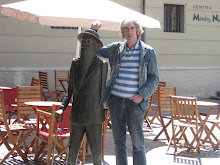I read with interest a short piece in the Xornal de Galicia today, entitled G-20 lingüístico. The writer, Fernando Ojea points out that it was odd that the leader of the world’s most spoken first language, Hu Jintao of China, could not speak with any other world leader at the recent G-20 in his own language. That's assuming the others don’t know Mandarin, of course.
Meanwhile, Zapatero (Spain) could talk freely with Calderón (Mexico) and Fernández (Argentina). At least four leaders at the summit, Obama (US), Brown (UK), Harper (Canada) and Rudd (Australia) could have a cosy chat. I’d also assume that the leaders of India and South Africa, where English is official, would have no problem joining in. Neither would too many others I guess – Zapatero excepted.
Lula of Brazil could talk shop directly with Barroso (the Portuguese PM and president of the European Commission). Ojea points out that this means a Galician speaker could have direct communication with five of these leaders, while a monolingual Spanish speaker would be limited to three. Ojea emphasises that “Galician is not the same as Portuguese” (this can be debated till the cows come home), but it allows for easy communication in its sister language. It is worth noting here, that representatives in the European Parliament can use Galician as it is accepted there orally as a form of Portuguese.
This brings me to a recent blog manifesto called O galego é útil (Galician is useful). It claims to be a-political and aims to promote the idea that knowledge of Galician makes it easier to learn other languages, as well as allowing for relatively easy communication with approximately 200 million native Portuguese speakers around the world.
Finally Ojea goes on to suggest that Portuguese should be the second foreign language taught in Galician schools and that if Galicians can master English, then they have the world at their feet. Indeed, it is very satisfying (if a little hypothetical) to think with my own knowledge of English, Spanish, Galician and Portuguese, that I could communicate with around half of the leaders at the G-20 in their native language.
Thursday, April 16, 2009
Subscribe to:
Post Comments (Atom)

No comments:
Post a Comment